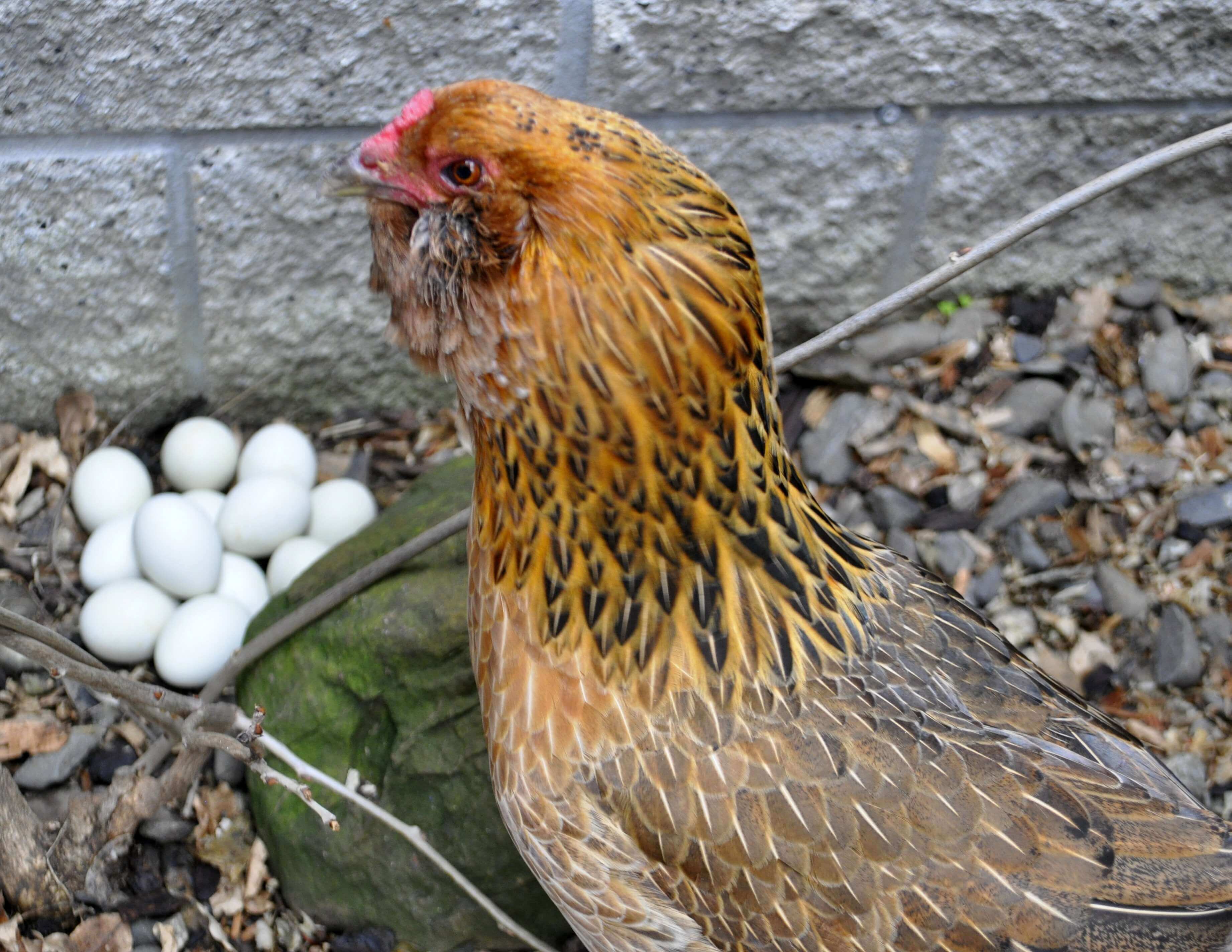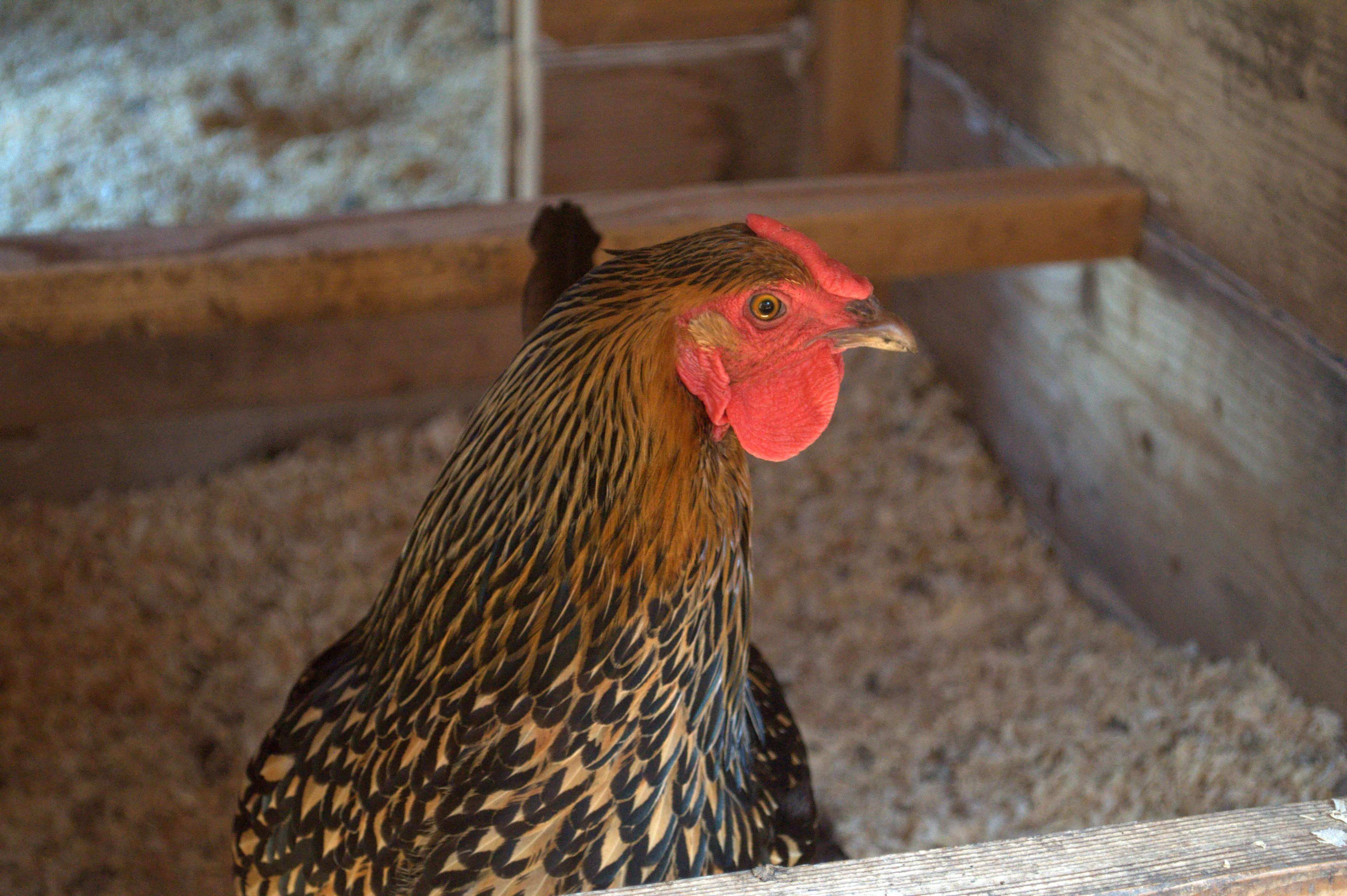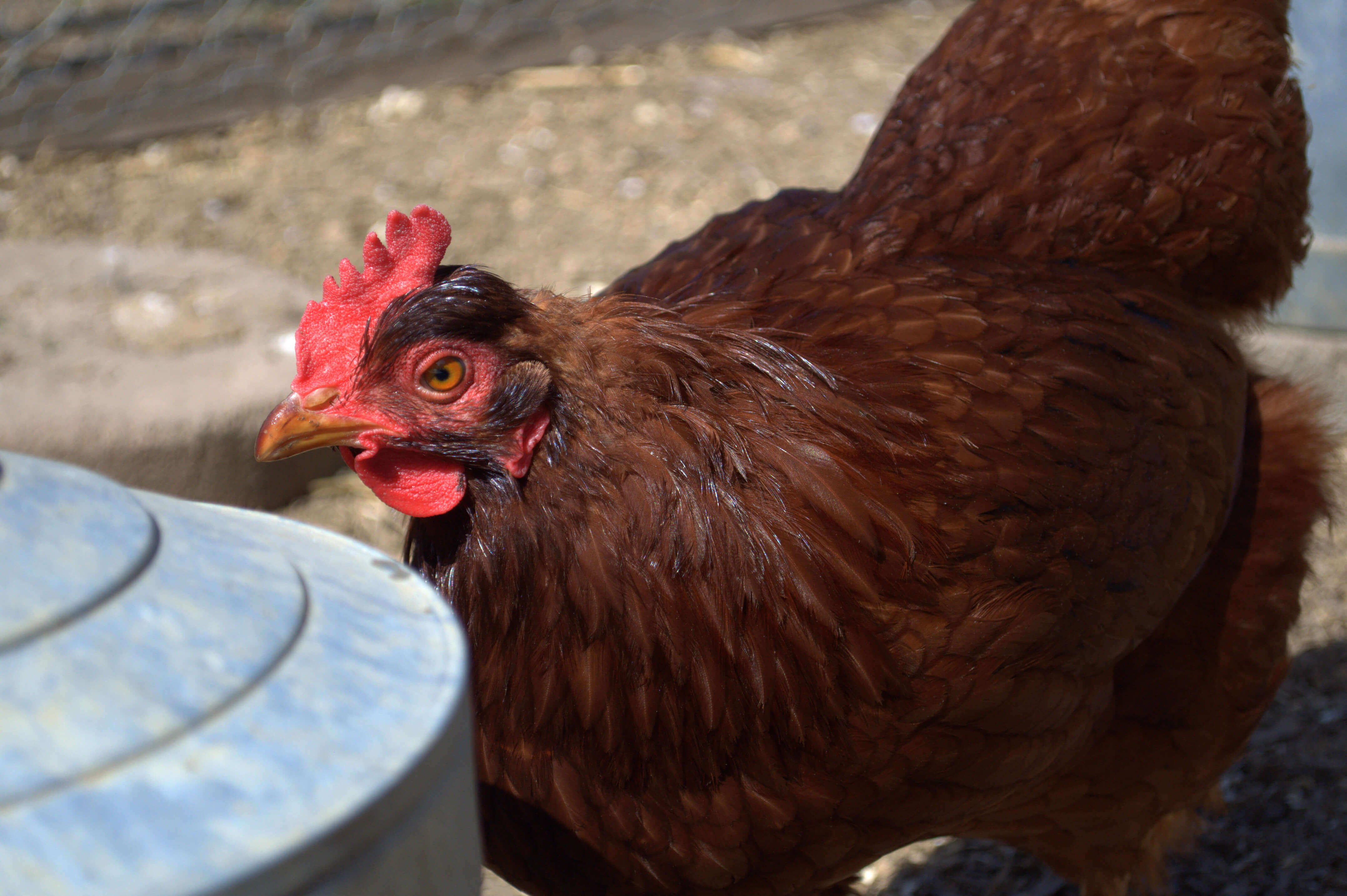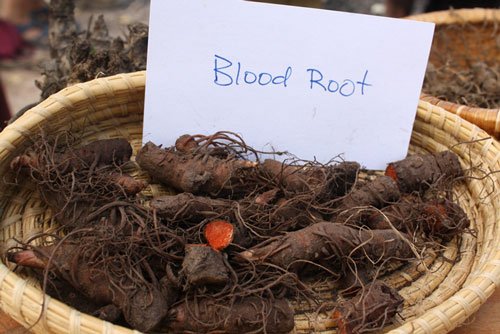Backyard Chicken Challenges
It’s been about about 2 1/2 years since my husband and I – inexperienced as we are – first took on the hobby of keeping backyard chickens; and what a joy it’s been. But we’ve most certainly seen our fair share of chicken woes also. It’s just bound to happen that with 8-10 chickens, problems “crop up”. I hope you can benefit from reading about the challenges we’ve dealt with over the past few years.
Feather Picking and/or Cannibalism
Certain chickens in our little flock of 8-10, are consistently divested of neck feathers. For our hens, this problematic behavior seems to be a “pecking order” thing, though I’ve read that feather picking can be indicative of a nutrient deficiency. As the pecking order among our hens has changed, so have the “pecked” hens. This can be a life-threatening thing if feather picking advances to the extent of drawing blood, called “cannibalism”. Our hens have never taken it to that level.
The pecking order thing really irritates me. Chickens are not kind and cuddly creatures – at least not with each other. “Brutal” is a better description! Why can’t they all “just get along”? But they don’t it seems, so my husband and I have had to try to resolve the issue. Having come to the conclusion that it was not a nutritional deficiency, we went shopping for a product that might help.
Our very helpful local feed store recommended that we use Rooster Booster – Pick-No-More Lotion. The lotion must be quite “distasteful” to the hens as we’ve only had to use one application whenever the chickens have resorted to defrocking one of their number. Look at this link for more information if your chickens are so inclined.

Internal Bacterial Infection
One of our hens, Mrs. Mendelbriet (she’s the black and white Plymouth Barred Rock above), became noticeably ill about six months ago. She stood in one place, feathers all ruffled up, and head down. She refused food and water and grew weaker and weaker as the days passed, eventually loosing more than half of her body weight. We separated her from the rest of the flock, knowing that she was a goner if things did not change soon.
On a Wednesday evening that same week, I took Mrs. M to a chicken vet I’d heard about. The vet thought she had a bacterial infection in her reproductive organs but couldn’t be sure without a multitude of costly tests. She told me that we could have her neutered and put on antibiotics to resolve the infection. “A neutered laying hen?”, I thought. Of course that just didn’t compute as an option.
The vet provided “comfort care” for Mrs. M., however, which included re-hydration and a nourishing meal delivered into her crop via a tube. I took her home. She showed no signs of improvement for the next two days after which I resigned myself to the inevitable. That is until I remembered that I had GSE (Grapefruit Seed Extract) in the medicine cabinet. So out came the GSE and in it went into the sick chick’s watering can. I managed to give Mrs. M. a few drops of the medicated water with an eye dropper. She also sipped minuscule amounts on her own.
 The next day, Friday, Mrs. M. drank more water on her own (still no food), and on Saturday she was practically gulping beakfuls of water (still no food). On Sunday evening, after gulping more water, I put Mrs. M. back with the other chickens. Having tossed some chicken scratch out on the ground, I watched in astonishment as she galloped over to the scratch and gobbled it up for a full five minutes, pecking the heads of the other chickens that got in her way. Then there was great rejoicing – a chicken come back from the dead.
The next day, Friday, Mrs. M. drank more water on her own (still no food), and on Saturday she was practically gulping beakfuls of water (still no food). On Sunday evening, after gulping more water, I put Mrs. M. back with the other chickens. Having tossed some chicken scratch out on the ground, I watched in astonishment as she galloped over to the scratch and gobbled it up for a full five minutes, pecking the heads of the other chickens that got in her way. Then there was great rejoicing – a chicken come back from the dead.
After about three months of recovery, during which time she lost most of her feathers and then regrew them, Mrs. Mendelbriet returned to the nest box in full grandeur of egg laying. She has shown no signs of diminishment at all. She is our Mrs. Mendelbriet, returned from the dead!
Egg-Bound Chickens
This is just what it sounds like – an egg becomes bound up inside the hen, making it impossible for her push it out. Over the past 2 1/2 years, we’ve only lost one chicken and it was because she was egg-bound. I have to say that I dropped the ball on this one because the chicken didn’t seem to be sick. I first realized that Hilda had a problem when the feathers around her vent remained wet with a clear, gel-like substance.
 Looking back, it should have seemed obvious that the substance was egg white, but I just didn’t put that together. Since Mrs. Mendelbriet had just been cured of her bacterial infection with GSE, I again added it to the watering can, thinking this would take care of of the new challenge.
Looking back, it should have seemed obvious that the substance was egg white, but I just didn’t put that together. Since Mrs. Mendelbriet had just been cured of her bacterial infection with GSE, I again added it to the watering can, thinking this would take care of of the new challenge.
Over the next week or so, Hilda didn’t get worse or better. She never acted sick like Mrs. Mendelbiret. And though I searched online for an answer to her symptoms, I could not come up with anything even relatively close to her what I was seeing with her. Also, I was determined not to run off to the chicken vet again.
After about two weeks of this, Robert found Hilda, dead, in the coop one morning. It was pretty gruesome. She was disemboweled (this is called “prolapse”). It was then that it became apparent to me what had happened. I went back to my computer and read about egg-binding and realized, too late, what my poor little Hilda’s difficulty had been.
If you have a chicken that exhibits symptoms of being egg-bound, go here to read more about this problem.
Broody Hens
A broody hen just wants to be a mother hen. Her only interest is hatching eggs. It’s a seasonal thing that occurs with some hens in the spring when new life is the order. She sits on any eggs she can find (even wooden eggs), and sits and sits and sits. Nothing deters her. This is a problem if the eggs are not fertile (we have no rooster in our flock, so of course, there will be no fertile eggs which hatch chicks). If the eggs are not fertile, the hen will continue to sit till her health is compromised. Such devotion! But obviously, something has to be done to save the little mama-wanna-be.
We’ve had two broody hens in our flock. One was Hilda, bless her little wattle! The other we dealt with this past spring – a spring that seemed would never end. Charlotte sat for months on eggs and sometimes on no eggs at all, with a far away look in her eyes. We continued to remove her from the nest box several times every day, relocating her (above her many angry objections) close to the feeder and watering can (this is actually one strategy to end the brooding). Thankfully she ate a little and drank a lot each time, but then it was right back to her mother-henning again.
One of the remedies for a broody hen, is to dip her into a pail of cool water for several minutes. It may help to bring her body temperature down a bit since broody hens tend to be hotter than normal in order to keep the eggs warm for hatching. This never really helped Charlotte. In fact, she became more irritated with me when I did it. I wondered if this is where the old saying , “madder than a wet hen”, came from.
For more information and some entertaining videos about broodiness in hens please refer to this article and here also.
Vitamin A Deficiency
Just a few days ago, I picked up our little Japanese bantam – we call her Ninja Chick – and noticed strange mineral-like formations protruding from her nostrils, almost resembling tiny horns (you may be able to see this in the photo to the right). (The weirdness of some chicken disorders just blows me away. I’m so glad my children didn’t manifest such peculiarities when they were little. Imagine that!) Ninja Chick manifested no other symptoms.
So into the house I went to investigate on the internet. After several frustrating hours, I gave up. Couldn’t find a thing about this one strange symptom.
They next day I picked up a chicken magazine a friend had just given me and perused through it. I wasn’t looking for any answers to my question about Ninja Chick, but there it was sure as life itself and, ironically, the title was, Looking for Answers. I read that birds deficient in vitamin A, “develop a crusty material in the nostrils”. There it was right before my eyes!
So, thankfully we will now treat Ninja Chick. Of course, the answer to the deficiency is lots of green foliage plants. The large chickens (eight of our 10) get plenty of greens as they free-range, but the two little bantams get out of the free-ranging area easily and we have not yet figured a way to keep them in. Though we toss greens into their pen, it apparently is not enough to supply enough vitamin A at least for Ninja Chick (Thumpalina, the other bantam, appears to be fine). We are looking for a supplement that could resolve the problem quickly.

Lameness
Another chicken, Aunt Bea (most of our large hens are named after Andy Griffith Show characters), recently developed, over a period of a month perhaps, an increasing weakness in her legs. She showed no outward injuries, abnormalities or swelling of any kind. Her feet and legs looked just fine, though when walking she looked arthritic to me. She became so weak that Robert had to literally remove her from the coop in the morning as she could not make it down the ramp on her own. She spent very little time on her feet, laying on the ground for most of the day. We observed no other symptoms at first but then her appetite diminished. She was obviously in trouble as this thing progressed.
Merek’s disease can manifest as lameness or paralyzing of the legs and/or wings, but everything I read about it convinced me that she did not have that. We are still not sure what it could have been and I’m happy to say “what it could have been” because she is recovering nicely now. We treated her with GSE and gave her a vitamin B suppplement, both added to the watering can (the other chickens are being treated as well). She is back on her feet for the better part of the day and eating well again.
A Word About GSE
Sometimes is just isn’t possible to diagnose a chicken illness. GSE has been a chicken life-saver at least twice in this regard of the unknown. It is good for bacterial and viral infections, internal parasites, fungal and yeast problems and more. I cannot recommend it highly enough, though I know it synthesized and is not entirely a natural product. Still I believe it is a better option than antibiotics and other pharmaceuticals that bring on additional problems that require additional pharmaceuticals. For more information regarding GSE, please check out this website.
Though at first I intended to also write about predators we’ve successfully dealt with, aggression in chickens and also rescue chickens, this post is already too long. Maybe next time I’ll cover those issues.
Meantime, what chicken challenges and woes have you dealt with? How did you resolve those issues, or did you?




Thank you very much for the very informative post. It was very interesting to me. My chickens are my pride and joy and I love to hear from others who have chickens in their backyards. I can tell you have done lots of research. Thanks again, I really enjoy your blog.
We use GSE for us all of the time. I never thought to add it to the chicken’s water. We have a very similar situation being just 3 years new to chickens. We have treated with probiotics, vitamin B and yogurt. We lost one to being egg bound and I felt the same feelings of guilt and “Why didn’t I think of this before now?!” We just got 5 more day olds 2 weeks ago and I hope they combine well with the rest of the flock when they are big enough to hold their own. We also got 25 meat birds, that’s a whole other post! Join Organic Chickens at yahoo groups to learn more. Thanks for this great post.
I was so surprised and happy to see your post. This is our first year with chickens (4) and are hoping to expand next year. I haven’t had any issues, but wondering where is the most useful place for finding regular care information. We love our chickens!
If you have a broody hen and have the room you can always get her a few chicks. You will have one happy mama and some cute adoptive babies then. So far so good with most of our hens. We shall see as time goes on.
@Rita,
We have done that and had fun watching mom and chicks grow. Our BEST hens by far have been from the chicks raised by a hen. It is amazing how little the chick spends under the mom, but still is warm enough. I wonder if we baby chicks to much with warm perfect conditions. Then we wonder why they don’t lay during the winter. I had a hen hatch out chicks in October! Those chicks would hang out next to mom outside exposed to the elements most of the time. It was amazing to me! Those hens are the best layers and the winter weather doesn’t bother them one bit!
Excellent article! Thanks for sharing. Would really like to read a sequel to this. It was a big help.
Yesterday we had our 6 chickens out free-ranging (we have a chicken tractor and live in suburbia) and a hawk came down and stole our chicken! Believing the hawk just couldn’t support the weight of our chick(en)– we found her at a neighbor’s house! Now I have to figure out how to protect our chickens from a HAWK!?!? Any suggestions? They love to free range & we love for them to do so…. but now I am thinking that won’t be possible and I should just build an extension to their cage?
@Jolene, I must say– she was ALIVE– delighting our hearts!!!
We have over 100 chickens and, of course, that get’s all the attention of plenty of hawks. We picked up a fake owl (with a head that rotates in the wind) and put it up on a perch (old hat-rack) in the chicken-yard. Originally we’d move the perch around every few weeks, but a this point, we’ve just left it sitting there for months. Moving about the yard or not – we haven’t had a single attack since “Betty” the owl took up residence. Good luck on your end!
We don’t have any chickens but I was intrigued and so I read your post. How interesting chickens are! I loved what you wrote (and how you write). I’ll be checking in again to see how your girls are doing (love the Andy Griffith theme).
Hi Sharon,
I very much appreciated your blog! Thank you so much! My father is a poultry pharmecutical sales men and his favorite part of his job is working on the organics. He discovered how amazing oil of oregano also is. Especially if you ever noticed coccidiosis (blood in the stool) oregano will help cure the chicken. And supposedly, it kills the bad e-coli and salmonilla. I really only use it in the winter when my chickens are cooped up a bit more. The website is VanBeekGlobal.com
We have an annoying issue. We have two crowing hens. There is no rooster present, and the hens do quite a good job on their own. They live outside my bedroom window, and often start crowing at 5am (even though daylight is starting to change now!). I really hate it. They crow at 5, 6, 7:30ish, and randomly throughout the day. I get up at 6, so the 5am one really gets on my nerves because sometimes I can’t fall back asleep before having to get up. And sometimes it wakes up the kids, who get up early enough as it is. Is there any way to stop this?
@Annie Donahue,
I had a couple loud hens before. For one I would put fresh greens out at night. She would be so happy the next morning she wouldn’t make much noise. The other hen thought that the greens were SO good she had to wake the other hens up to come and join. So for her I would catch her at night and put her in a kennel in the garage to sleep in all night. It was darker in there for longer so she slept longer. Then when she did make noise the garage muted the noise. Then I would take her out in the morning when it wasn’t so early. It was extra work, but the sleep was worth it.
@waggie,
We also have a crowing hen. But it hasn’t been a problem because the coop is dark even after the sunrises, when we let the chickens out. The neighbors have never complained even though she’s crowing at about 6:30 a.m. She isn’t as loud as a rooster and her crow sounds kind of like a cross between a hoarse dog and a rooster. It’s pretty pathetic.
Can you keep your hens in a dark place till after sunrise?
@Annie Donahue,
A couple of our hens were doing the same thing, and the others soon joined them! We figured out that they were spoiled from being so free at night. 😛 We had been letting them be free all night, as well as the day, but were tired if cleaning up the porch each morning. 😉 But once we started putting them in their (very spacious) coop at night, they became very loud. And soon they were doing it anytime we put them in the coop! Not sure if this does anything for you, but it’s funny to remember. :0)
I am new at raising guinea keats. I had one die at 7 wks. (I think because it got chilled–It was in a wire cage covered with a tarp, outside, and the temp probably went from 90 degrees to 75 degrees)
I lost another keat at 9 wks. They were in the garage, covered with a tarp.
We put them in the garage every night now and cover them with a tarp. It gets down to 70 degrees in the garage, and around 56-60 degrees now at night.
I feel so bad if my lack of knowledge was what killed them!!! I am now overly careful about keeping them warm! I am wondering how old they need to be before they can stay outside at night? They are getting older, but the nights are gettilng colder!! My idea was to let them free range and then lock them up at night in a dog cage–to keep them safe from nighttime predators.
I haven’t been able to find any info about how old they need to be to stay outside. Our nights are around 56 degrees now.
I have heard that guineas are pretty hardy and eat lots of insects and ticks!!
Any helpful info would be very much appreciated!!
We haven’t had too many problems in the past 6 years we’ve been keeping chickens. Recently because of the extreme drought in Texas and thus not enough forage we had a serious outbreak of fowl pox. This disease is carried by mosquitoes and normally a few birds will get a mild case every year but we don’t really worry about it.
This year however, before it occurred to us that their forage wasn’t good enough anymore, they all got extremely sick. We normally feed them scratch grain, grit, kitchen scraps, and oyster shell to supplement the grass, plants, bugs, and worms they eat (and sometimes snakes, frogs and mice when they can catch them!) but of course with little growing in the fields, insects and worms dead or hiding, they got malnourished, thus the outbreak.
So, because some of these chickens were near death I went ahead and started feeding them complete feed. This is something I’ve never done and not the way we would normally want to raise our chickens. It’s ground and formed into pellets with all kinds of supplements and antibiotics. This is what most people feed their laying hens. But, it quickly solved their malnourishment problem and within 2 days, the chicken I thought was going to die first (I even preemptively dug a hole for her) was bouncing and flapping and eating.
Other than that I’ve had a few mysterious deaths… mostly in the batch of chickens which was least healthy of all the flocks we’ve raised (our flock includes 3 different sets of chickens we raised from chicks). I’ve also had some predator attacks and one of my oldest hens got an infection in her leg where her leg band nicked her. That was the most doctoring we’ve done for a chicken as it required daily cleaning and removal of scar tissue with caustic powder. I’m amazed but she did recover.
Mostly if one of our chickens is sick we try to make sure it has everything it needs to be healthy in general (good food, clean water, appropriate shade and shelter) but we mostly leave it alone to recover or die. Our chickens aren’t really pets so we don’t spend vet money on them. On the other hand, we also don’t kill and eat them when their lay diminishes after a few years. If we had more (right now there are 27) we would have to kill and replace them but for the moment we’re content to have relate to them somewhere between farm animals and pets.
I really enjoyed this post. We do not have poultry yet, but we would like to soon. Thanks for sharing.
I love VetRX. It’s essential oils and all natural. There are varieties for other animals so get the poultry variety for chickens. It’s great for respiratory issues, parasites/mites, and more. I add it to water and spray on the hens. Then whey they clean themselves they ingest it. You can also put a drop into some water (just also give them plain water as an option). If it’s really a bad cold you can put a drop of the oil directly on the nostril. I also add it to water and spray their coop when I clean it. It freshens i up and also prevents parasites/mites from moving in.
We’ve enjoyed our 3 backyard chickens for 2 1/2 years now. Luckily we’ve had zero health problems with them. This summer, however, they went through a bit of dry spell laying eggs (we had thought it was due to heat), but my husband bought the original chicken feed we used to use, and within a week they started laying again.
I posted about my backyard chickens at: http://heartandhaven.com/2011/07/11/backyard-chickens/
Our city is currently trying to pass an ordinance to allow us to have chickens. I am SO excited! But I also have so much to learn! I love this article!
Thank you for this post! We have 12 girls at our place. After reading this I now know that our Joanna who we lost a few months back was egg-bound. My husband described it every so gently as a “blow out” ick!
thank you! I have had chickens about the same amount of time you have and also had a pecking problemI wish I had known about the rooster booster before I sold two of my hens( the mean ones). I was wondering have you introduced new bird in to the flock either raise from chicks or already grown birds if so was it successful and any tips would be welcomed.
I loved this post!!! We recently moved from our tiny suburbia AZ home, and had to give our chickens to our friends… Love the Gse idea!! We never had any real issues, but the crystals in their nostrils (which makes sense living in the desert!) Our 4 hens were very friendly though, and my daughters would pick them up so casually. Our Production Reds were the most friendly, and I would often find them cuddling with my toddler in the doghouse. She would wrap the hens in the dog blankets, tuck her in, and sing lullabies while she stroked her head. LOL
Fabulous insight! I am going to get some GSE for my flock. The girls and their naked rooster (naked-neck featherless mutation) have enriched our lives. I lost 5 hens in the last 2 years and am determined to learn more prevention.
Have you tried giving your vitamin A deficient chicken any carrots or lightly steamed sweet potatoes. I would also consider chili peppers & butternut squash. All are excellent sources of vitamin A as well. All but the squash have higher amounts of the vitamin A than the dark leafy greens. But I happen to know that most birds love squash and pumpkins if you’ll open them up!
Hello,
Could you tell me the following:
What do you think causes pecking? Were you able to rule out crowded spaces and lack of access to foraging as the causes? Thanks
Philippe
We have recently become chicken farmers, obtaining our first hens in March. We now have 41 chickens (27 hens and 14 youngsters). This morning, while my husband was letting everyone outside, he discovered a WORM!! Knowing that I have some medical experience, he contained it and brought it in for me to see. It is definately a round worm. We have been scouring the internet all morning, looking for more holistic treatments that work well. I have seen GSE on several sites (mostly aimed at humans) and was thrilled to see it here.
I would really like to know the GSE to water ratio. If this worm issue is in the early stages, we’d like to get it taken care of as quickly as possible. We are fairly certain that it was from one of our newest additions.